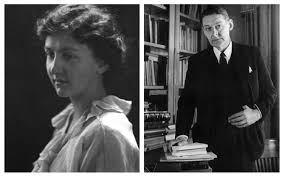Lyndall Gordon at The Hudson Review:
 What she was up against were, in short, warnings. These were most explicit each Lent and Easter. In April 1932, Eliot said he had gained so much that he could not give up his journey towards what he termed “reality”: as he put it in the Quartets, “human kind / Cannot bear very much reality.” The real thing lay beyond life, and he could no longer accept the kind of love that would mean giving that up. If he were to rank his two narratives, the supernatural did come first. Desire was evil, he believed, and talking to Hale more frankly than to anyone, he explained how difficult it was to fight this evil when he woke in the morning. When she notes his diminished expressiveness in the spring and summer of 1932, he explains this as a strategy, inseparable from unsatisfied desire. His typewriter stumbles, he crosses out and picks up the thought again with more deliberation, putting companionship before passion, then dependence, reverence and a protective instinct. He decides to label his feeling for her “respect.” True enough, though only one strand. He was not so earnest that he did not sometimes fix on her bathing costume and wavy hair.
What she was up against were, in short, warnings. These were most explicit each Lent and Easter. In April 1932, Eliot said he had gained so much that he could not give up his journey towards what he termed “reality”: as he put it in the Quartets, “human kind / Cannot bear very much reality.” The real thing lay beyond life, and he could no longer accept the kind of love that would mean giving that up. If he were to rank his two narratives, the supernatural did come first. Desire was evil, he believed, and talking to Hale more frankly than to anyone, he explained how difficult it was to fight this evil when he woke in the morning. When she notes his diminished expressiveness in the spring and summer of 1932, he explains this as a strategy, inseparable from unsatisfied desire. His typewriter stumbles, he crosses out and picks up the thought again with more deliberation, putting companionship before passion, then dependence, reverence and a protective instinct. He decides to label his feeling for her “respect.” True enough, though only one strand. He was not so earnest that he did not sometimes fix on her bathing costume and wavy hair.
more here.
